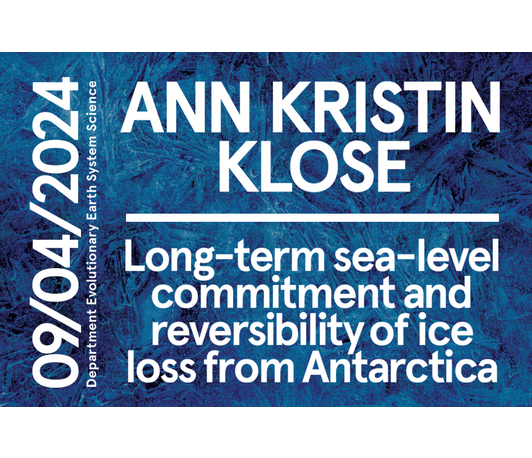Long-term sea-level commitment and reversibility of ice loss from Antarctica
- Date: Apr 9, 2024
- Time: 03:00 PM - 04:30 PM (Local Time Germany)
- Speaker: Ann Kristin Klose
- PhD student in Climate Physics at University of Potsdam and the Potsdam Institute of Climate Impact Research (PIK)
- Location: MPI of Geoanthropology
- Room: Villa V14
- Host: Department Evolutionary Earth Systems Science
- Contact: rennoffice@gea.mpg.de

Abstract
The evolution of the Antarctic Ice Sheet is ofvital importance given the coastal and societal implications of ice loss, witha potential to raise sea level by up to 58 m if melted entirely. However,future ice-sheet trajectories remain highly uncertain. In fact, currentestimates range from a slight mass gain to a mass loss of the Antarctic IceSheet by the end of this century. What is more, due to ice-sheet inertia andpotentially self-sustained mass loss when exceeding critical thresholds ortipping points, the bulk of sea-level rise is expected to arise beyond the endof this century as sea-level commitment.
Here, we systematicallyassess this long-term committed sea-level contribution from the Antarctic IceSheet in response to warming projected over the next centuries under lower- andhigher-emission pathways, as well as the reversibility of the committedlarge-scale ice-sheet changes when reducing warming to relatively colderclimate conditions.
We find that alreadythe lower-emission pathway poses a considerable risk of Antarctic ice loss,raising global mean sea level by multiple meters over the next millennia in ourexperiments. Beyond warming levels reached by the end of this century under thehigher-emission climate trajectories, a collapse of the West Antarctic IceSheet is triggered in our entire ensemble of simulations. Additional EastAntarctic ice loss may increase sea level by several tens of meters over thenext millennia with enhanced warming, stressing the importance of including thecommitted Antarctic sea-level contribution in future projections. Givenice-sheet inertia, an early reversal of climate may allow for avoiding this self-sustainedAntarctic ice loss that would otherwise be irreversible (for the same reductionin warming) due to multistability of the ice sheet. While we show that such ‘safe’overshoots of critical thresholds in Antarctica may be possible, it is alsoclear that limiting global warming is the only viable option to evade the riskof widespread ice loss in the long term.
Speaker Bio
Ann Kristin Klose is a PhD student in Climate Physics at University of Potsdamand the Potsdam Institute of Climate Impact Research (PIK) where she is part ofthe Research Group ‘Ice Dynamics’ and the FutureLab ‘Earth Resilience in theAnthropocene’. Her PhD project embedded in the EU-H2020 project PROTECT aims atunderstanding possible future trajectories of the Antarctic Ice Sheet onmulti-millennial timescales, based on ice-sheet modelling and complex systemstheory. Her current research focuses on (1) the Antarctic sea-levelcommitment, compared to typicalsea-level projections covering decadal to centennial timescales, (2) thereversibility of ice loss including so-called ‘safe’ overshoots and(3) the potential for critical transitions (tipping) of the AntarcticIce Sheet. Ann Kristin studied Environmental Sciences and Modelling atUniversity of Oldenburg (Germany) and at University of Bergen (Norway).